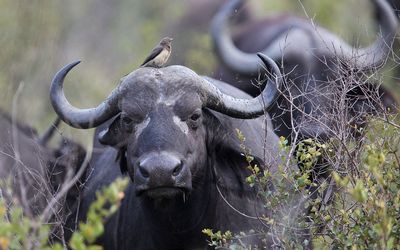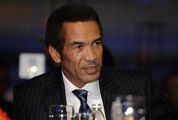Breeder aims to be a big game changer in ‘white’ industry
by Staff Writer,
2015-09-04 06:14:42.0
THE game-breeding industry in SA is the epitome of white, khaki-clad Afrikaner life — just the sort of business black entrepreneur Mike Gcabo loves to break into.
Game breeding, when prized animals are bred, bought and sold, has been dominated by whites.
But today, new breeders like Mr Gcabo are making their mark, vowing to upend the status quo in a lucrative and glamorous sector.
"I have a number of black investors who have invested their money with me and I set out to deliberately bring them into the fold," he said.
Mr Gcabo, who made his money as a mining consultant and later served in government, is upbeat about the future and keen to share his expertise and enthusiasm.
Each year, an elite group of farm owners spends millions on animals at auctions across the country where the breeders display their finest specimens.
Some animals are used for trophy hunting, with hunters paying a premium to hunt an animal, whether it is a black impala, a golden wildebeest, or a buffalo with massive horns.
But the best are kept to be admired, shown off as status symbols and used for breeding.
"I’m working with a number of communities to help them start breeding. We provide a ram, they provide the ewe," Mr Gcabo said.
On his farm in the Kalahari desert, Mr Gcabo rounded up some of his finest impala and wildebeest that were already sold at his first auction months ago.
Other game breeders — most of them white and Afrikaans — helped him load a black impala worth more than $24,000 into a trailer to be taken to its new owner.
"It went well, it’s just that there is always a moment of tension," said Mr Gcabo.
The ethnic bias in the game-breeding business makes the industry a target for reform.
Just 15 out of the 1,500 farm owners who belong to Wildlife Ranching SA, the national association of game breeders, are black.
"Obviously, with democracy, there were a few newcomers," said Peter Oberem, the association’s president. "The best known of all would be Cyril Ramaphosa."
Mr Oberem acknowledges that for the industry to thrive it needs to do more to diversify and broaden its public interest.
He is in talks with government to organise a collaboration with black farmers who have won a land claim or have bought government land to run game-breeding businesses.
AFP

Hunters pay a premium to hunt an animal. Picture: GALLO IMAGES/RAYMOND PRESTON
THE game-breeding industry in SA is the epitome of white, khaki-clad Afrikaner life — just the sort of business black entrepreneur Mike Gcabo loves to break into.
Game breeding, when prized animals are bred, bought and sold, has been dominated by whites.
But today, new breeders like Mr Gcabo are making their mark, vowing to upend the status quo in a lucrative and glamorous sector.
"I have a number of black investors who have invested their money with me and I set out to deliberately bring them into the fold," he said.
Mr Gcabo, who made his money as a mining consultant and later served in government, is upbeat about the future and keen to share his expertise and enthusiasm.
Each year, an elite group of farm owners spends millions on animals at auctions across the country where the breeders display their finest specimens.
Some animals are used for trophy hunting, with hunters paying a premium to hunt an animal, whether it is a black impala, a golden wildebeest, or a buffalo with massive horns.
But the best are kept to be admired, shown off as status symbols and used for breeding.
"I’m working with a number of communities to help them start breeding. We provide a ram, they provide the ewe," Mr Gcabo said.
On his farm in the Kalahari desert, Mr Gcabo rounded up some of his finest impala and wildebeest that were already sold at his first auction months ago.
Other game breeders — most of them white and Afrikaans — helped him load a black impala worth more than $24,000 into a trailer to be taken to its new owner.
"It went well, it’s just that there is always a moment of tension," said Mr Gcabo.
The ethnic bias in the game-breeding business makes the industry a target for reform.
Just 15 out of the 1,500 farm owners who belong to Wildlife Ranching SA, the national association of game breeders, are black.
"Obviously, with democracy, there were a few newcomers," said Peter Oberem, the association’s president. "The best known of all would be Cyril Ramaphosa."
Mr Oberem acknowledges that for the industry to thrive it needs to do more to diversify and broaden its public interest.
He is in talks with government to organise a collaboration with black farmers who have won a land claim or have bought government land to run game-breeding businesses.
AFP





















Change: -2.60%
Change: -2.88%
Change: -2.44%
Change: -2.44%
Change: -5.26%
Data supplied by Profile Data
Change: 0.00%
Change: 0.00%
Change: -2.60%
Change: 0.00%
Change: 0.00%
Data supplied by Profile Data
Change: 1.98%
Change: -0.06%
Change: -0.19%
Change: -0.09%
Change: 0.57%
Data supplied by Profile Data
Change: 0.00%
Change: 0.00%
Change: 0.00%
Change: 0.00%
Change: 0.00%
Data supplied by Profile Data